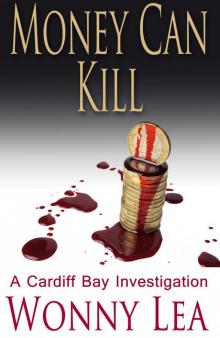Never Dead Read online
Page 4
‘Well, I don’t know about clues,’ replied Martin ‘but I can already think of a dozen or more questions that weren’t asked back then, and I’m getting the feeling that for some reason this case was prematurely closed. I’m going to find John Evans and see if that old copper’s nose of his can help me find out why I think something doesn’t smell right.
‘When you report back to Matt tell him I wish him well with his first lead case, and that it looks like we both have our work cut out. I know he’ll be as excited as I was – but I actually think I’m even more elated by the possibility of solving a murder somebody wanted to bury all those years ago.’
Chapter Four
‘I don’t know where the hell he is so there’s no point in you questioning me. He’s been getting up at the crack of dawn and going somewhere every day for the past week, but he’s back by late afternoon most days. I didn’t hear him leave yesterday morning, but he must have done and I’ve not seen him since.’
Lizzie had confronted her mother regarding her father’s whereabouts, but even as she did, she knew she was wasting her time. Catherine Ferguson was already putting on her cream leather gloves and heading for the door.
‘Get a grip, Lizzie! Your father is big enough and ugly enough to take care of himself. It can’t come as any surprise to you that we’ve been husband and wife in name only for more years than I care to remember …’
Catherine turned back towards her daughter and for a moment looked as if she was going to bare her soul, but with a shrug of her shoulders she thought better of it. At the best of times she was a cold fish, and the smiling images of her fronting her latest charity campaign belied the real Catherine Ferguson. She adored being in the limelight, was the ultimate social animal and an excellent fundraiser, but ultimately everything she did was in her own best interests.
After marrying Edward she’d moved into the Ferguson family home on the outskirts of Malmesbury, and since the death of Edward’s parents the mansion had been theirs. Being the lady of the manor fitted Catherine even better than her tailor-made gloves, and it was the reason she hadn’t sought a divorce although their marriage was a farce.
‘But aren’t you even a bit worried about him?’ persisted Lizzie. ‘I’ve never known him go off anywhere without letting me know …’
‘Yes, but he didn’t know you were going to be here, so he wouldn’t be expecting you fussing around like a mother hen. There’s nothing whatsoever unusual about the lack of communication between your father and I – we live our own lives and that’s the way we like it. Why are you here anyway? I thought you had some new protégée you were coaching to do what you never managed to achieve. What is it they say – he who can, does, he who cannot, teaches!’
‘Why do you constantly find the need to remind me of how, in your opinion, I failed? Most mothers would be proud that their daughter got to number three in the world, and everyone says if it hadn’t been for my shoulder injury I would have made it to number one.’
‘Change the record, Lizzie, that’s all your father ever goes on about – but we’ll never know, will we? When he does turn up, tell him the BBC want to film here next week when I launch the latest appeal. They like that someone from such an affluent background as this is highlighting the plight of a particular group of Somalis. I’m happy to do the PR from this end, though I draw the line at handing out food parcels with the minions.’
Lizzie watched through the window as her mother walked towards her car and remotely zapped the driver’s door open. Catherine Ferguson had turned sixty last year but women half her age would give the world for her looks and figure. She had been the perfect blue-eyed blonde, and although the years had taken some of the colour from her hair it had been skilfully replaced by her expensive hairdressers. Her skin miraculously showed none of the effects of several decades of heavy smoking, but then it had been seriously helped by everything short of the surgeon’s knife. Not that Catherine hadn’t considered cosmetic surgery, it was just that even temporary post-operative disfigurement was too much to contemplate.
Lizzie couldn’t remember the last time she had been hugged by her mother. As far back as she could recall, the nearest they came to any contact was the affected air-kissing ritual Catherine had perfected, and used whenever the two women met in public. The routine was not reserved for her daughter – it was for anyone of a certain social status, and recipients were left with the intensely flowery fragrance of her Jean Patou perfume. For Lizzie the ultra-expensive scent of ‘Joy’ could never mask the fact that her mother chain-smoked, and the lingering combination of perfume and cigarettes made her feel quite sick.
Lizzie watched the black Land Rover crunch over the gravel surrounding the house. It always surprised her that her mother didn’t drive a flash sports car. The sturdy vehicle easily negotiated the uneven quarter of a mile stretch to the rear entrance of the property, where the metal gates could be operated from the convenience of the dashboard.
In spite of what she’d just told her daughter Catherine knew exactly where her husband had been going. In recent years he’d barely left Woodcanton Hall, so when he’d returned after his second successive morning outing she’d known he was up to something. Rummaging through his pockets when he was asleep, she found railway tickets from South Wales, and she guessed he was organising something he’d hankered after for years. She had to find out what exactly he was doing, and so calling on the help of some unsavoury friends she’d had him followed.
Initial reports suggested he was stalking a young woman. He’d apparently watched her from the corner of her street and then at the railway station. Then for two days in a row he’d caught the train that she normally used, but at a point further up the line. He just seemed content to have her in his sights. The reports suggested that he was behaving like an old man besotted with a young girl. Catherine demanded a photograph of her, and the image left her in no doubt that this was Lizzie’s daughter. The old fool was looking to reconcile with his granddaughter.
Catherine had always belittled Edward for his measured ways but now she was grateful for them. It wouldn’t have been in his nature just to turn up on his granddaughter’s doorstep and introduce himself. He would need to convince himself that a meeting would be in her best interests. Catherine couldn’t see that as the act of a kind and caring man; it just reinforced her opinion of him as weak. It also gave her the opportunity of stopping that meeting from ever happening …
Lizzie would have been amazed had she been able to access her mother’s thoughts as she watched the Land Rover drive off. She thought about where her dad could be, but even before Catherine’s rear numberplate disappeared from view she was distracted by the persistent buzzing from the intercom in the hall.
‘We’re here, Lizzie – wow, what a place! Let us in, we can’t wait to get a better view.’
Lizzie pressed the release button for the gates at the main entrance and opened the front door ready to greet her visitors. Della was driving and Basil had his head, shoulders, and most of his body through the window, waving his arms as if to demonstrate the sheer size and splendour of the surroundings.
Della caught sight of Lizzie’s car and pulled in alongside it.
‘So this is where you were brought up – you lucky sod! How could you bear to leave? Will you inherit this lot? Where are the tennis courts?’
‘Take a breath, why don’t you! Follow me and we’ll grab something to eat, and then I’ll show you around before we work out some sort of training plan. I take it you still have the next few days free so we should get through quite a bit in that time.’
Della Pugh was the protégée to whom Catherine Ferguson had been referring. Their arrangement was barely five months old, but Lizzie was convinced that with her as the coach and Basil Copeland as the fitness instructor, Della would make it all the way to the top of the tennis tree. Just seventeen, she already had a number of junior titles under her belt. Their plan was to follow the tournaments in warmer climes during the w
inter and break into the European scene in the spring.
Normally their training sessions were held at the Waverley Tennis Club, but they were starting to attract too much attention and so Lizzie had suggested using the facilities at her parents’ home. She knew that the danger of introducing her partners to what was on offer was that they would always want to come to the Hall, and it wasn’t somewhere she wanted to spend too much time.
As a child she had adored the house and the gardens, but during school holidays it had been a lonely existence. She had an older brother, but he was the apple of her mother’s eye and had spent his school holidays being introduced to the great and the good of London society. It was obvious from a tender age that he was heading for a career in politics and that their mother was going to help him get to the top.
Due to difficulties with the family business, Lizzie’s dad, Edward, hadn’t been around much when his children were growing up. Lizzie remembered that it was after the guests had left her fourteenth birthday party when he made an announcement. It seemed that he had brought the business back from the brink of financial ruin and secured a number of unbelievably lucrative contracts that meant his company was solid and he could hand over its management to a board of trustees.
Catherine made it perfectly clear that he was too late to be influencing his son’s future in the direction of the family business. Instead of feeling the disappointment he might have expected, Edward felt relief. His son was so much like his mother it was uncanny. They both fed off a mutual admiration, embracing people they deemed to be important and leaving no space for others – not even members of the family.
For the next year, at every opportunity, Edward had spent time with his daughter, often playing tennis. It didn’t take him long to realise that she had a real talent for the game and he hired a personal coach. If her mother had been around more and had been a little less besotted with her son, she would probably have noticed that the coach was more interested in what her fifteen-year-old daughter had to offer off the court than rather than on it.
The revelation that Lizzie was not just pregnant but also beyond the point of a legal termination split the family even further. Charles Ferguson was convinced that a front-page story, of his underage sister being raped by a celebrated tennis coach, would ruin the promising political career that was opening up to him. His mother wholeheartedly agreed, and Lizzie’s pregnancy, delivery, and the adoption of her child were all taken care of like a covert military operation.
Until recently Lizzie believed she’d been able to put that episode of her life behind her. With the help of her father and a new tennis coach, she had gone on to make a name for herself – one that even her mother and brother approved of. She became the darling of the British nation, not just because she was the ladies’ tennis star they had been dreaming of, but also because she was a charismatic and attractive young woman. It wasn’t difficult, with all the resulting attention, for Lizzie to bury a section of her life that, when she did bring it to mind, caused her to feel dead inside. Yet lately she was finding it more difficult to put a lid on the past, and frequently found herself wondering what had happened to her baby. She was already in her mid-thirties, her biological clock in full swing, and she was discovering strong maternal feelings that had been well-hidden until now.
‘We won’t get anything done if you don’t stop daydreaming!’ Della interrupted Lizzie’s thoughts. ‘Basil’s already found the tennis courts. I can’t believe how lucky I am! Are you sure your family won’t mind if we use them? Shouldn’t you ask someone if it’s OK for us to just park ourselves here? I keep getting the feeling that someone will turn up with a shotgun and order us off the premises.’
Lizzie laughed. ‘My father’s been nagging me for years to make use of the things he set up for me. A while ago he went to the length of looking at developing a live-in training hostel for underprivileged children with a passion for tennis.’
‘I love the sound of your father! What stopped him going ahead with his plans? Is he around – I’d love to meet him.’
‘I’m hoping he will turn up or at least give me a call sometime today. I didn’t tell him I was coming here – I know he’ll be absolutely made up with our plans and I wanted to surprise him. To be honest I can’t think where he’s gone, he doesn’t use his car that much and when I think about it, I can’t remember him having a night away from here, not in years.’
‘Can’t you call him?
‘He’s practically allergic to mobile phones! I’ve bought him two over the years but I suspect they’re still in their boxes, unopened –’
Basil had returned from investigating what was on offer to him as a trainer and interrupted. ‘What car does your father drive?’
‘He’s had the same make of car for donkey’s years – or is it donkey’s ears, I can never remember. Anyway, his latest Jaguar’s about five years old and the same colour as all the others and that’s about all I know. Why do you ask?’
Instead of answering the question Basil asked another. ‘Is it a deep burgundy colour?’
‘Yes, but how the hell do you know that?’
‘There are only two things parked in that row of garages and outhouses near the tennis courts, one is a huge motorised lawnmower and the other is a fantastic Jag. I wouldn’t have a clue about what model it is but we seem to agree on the colour.’
‘Parked in that row of garages,’ echoed Lizzie. ‘But that’s impossible! None of us ever uses those garages, they’re going to be converted into living accommodation if my father’s tennis school ever comes to fruition. We all park outside the house, just like you did earlier. I need to check this out.’
A few minutes later Lizzie was standing with her arms folded looking accusingly at the bonnet of her father’s car.
‘There is no way on earth my father would have left his prize possession here – and look at the state of it! He’d never have parked it with mud on the hubcaps and bits of leaves and stuff caught up in the windscreen wipers. No, this isn’t right. I wish to God I could have persuaded him to carry a mobile phone.’
Lizzie peered through the passenger window because she could see her father’s coat draped over the seat.
‘What’s that underneath his coat?’ She moved aside so that Basil could get a better look.
‘I think it’s a wallet but I can’t see it properly.’ He bent down to view the interior of the car from a different angle. ‘No. It’s a small brown leather case with a zip and some sort of pattern like Chinese writing on the top.’
‘It’s not Chinese writing – it’s my father’s initials laid one on top of the other. His full name is Edward Philip Ferguson, and as a child I made him what I called his personal logo. Starting with the E, the P a bit bigger and to the left, and finally the F, slightly to the right and biggest of all. He loved the design and started putting it on lots of his personal stuff.’
As she spoke Lizzie was attempting to open the car doors and the boot and it was clear that she was getting more anxious.
‘Don’t mess around with the doors anymore,’ urged Basil. ‘I’m surprised you haven’t already set off the alarm. Is there a spare set of keys anywhere? Surely there must be some way of you contacting your father – what about your mother, would she know how to get hold of him?’
Lizzie shook her head. ‘If you knew my parents you wouldn’t ask that question. I can’t see me thinking about tennis strategies for the moment. Why don’t you two settle into the rooms I pointed out to you earlier, grab something from the kitchen, and make yourselves at home. Use all the facilities you want, and just take a look at the programme I’ve drawn up – it’s designed to get Della match-perfect in time for the Australian Open. I’ll catch up with you as soon as I’ve sorted out what’s going on with my father.’
Lizzie crossed the strip of grass and made her way towards the house. She looked back towards the garages and remembered that the last time she was at Woodcanton Hall there had been two cars parked in thos
e garages. Her father had told her that they belonged to some friends of her mother, but when she’d asked her mother about them Catherine told her to mind her own business.
Her father had been a bit more forthcoming, explaining that he had overheard Catherine talking to two of the men about some sort of lecture tour to raise money for the Somali charity. Lizzie had seen three men leave in one of the cars later that afternoon and she’d reproached herself for being judgemental. She’d thought that all three looked like thugs – but her mother was clearly at ease in their company.
She remembered them now and the memory seemed to be encroaching on her worries about her father, even though although the connection didn’t make any sense to her.
As she reached the front door the sound of the telephone ringing interrupted her thoughts and she subconsciously realised that it had been ringing for some time. So much so that by the time she picked up the receiver the line had gone dead. Worried that she had missed a call from her father, Lizzie dialled 1471 but only to hear that the caller’s number was withheld.
She made her way to her father’s room with the intention of looking for an address book, or something that may have contact numbers for some of his friends. Even before she had reached his room, on the second floor, the telephone rang again and she rushed ahead to pick up the extension at his bedside. She paused after the caller spoke, before saying, ‘Yes, this is the home of Edward Ferguson, but I’m afraid he’s not here at the moment. I’m his daughter. Who did you say you are?’
There was a moment of hesitation on the line as Matt fought hard to find the right words.
‘My name is Detective Inspector Matthew Pryor and I’m investigating the death of a gentleman who was found on a train in Cardiff yesterday morning. He had no means of identification on him, but we have traced his journey back to a car that was left in the parking area of Treorchy station and the car, a burgundy Jaguar, is registered to a Mr Edward Philip Ferguson.’

 Killing by Colours
Killing by Colours Jack-Knifed
Jack-Knifed Never Dead
Never Dead The Coopers Field Murder
The Coopers Field Murder Money Can Kill
Money Can Kill